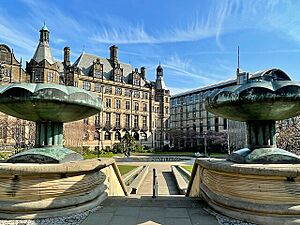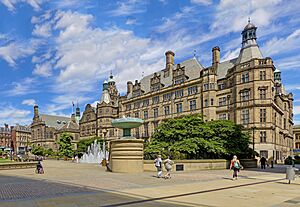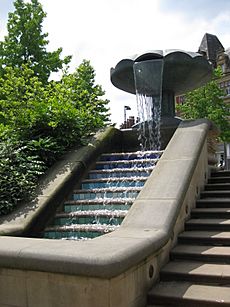Peace Gardens facts for kids

The Peace Gardens
|
|
| Former name(s) | St Paul's Gardens |
|---|---|
| Maintained by | City of Sheffield |
| Location | Sheffield, England |
| Coordinates | 53°22′48″N 1°28′11″W / 53.38°N 1.4696°W |
| Construction | |
| Completion | 1938 |
The Peace Gardens are a lovely public space right in the middle of Sheffield, England. It's like a big square where people can relax. This garden is located in front of Sheffield's beautiful Gothic-style Town Hall. Don't mix it up with the Sheffield City Hall, which is a place for concerts, or the Sheffield Old Town Hall near Castle Market!
Contents
A Look Back: History
The Peace Gardens were first created in 1938. This happened after an old building called St Paul's Church was taken down. At first, they were called St Paul's Gardens. But people quickly started calling them the "Peace Gardens." This was because a big peace agreement, the Munich Agreement, was signed around that time.
The original plan was to build an extension for the Town Hall here. But then World War II started, so the extension was never built. In 1985, the space was officially renamed the "Peace Gardens." These gardens are a great example of many similar public spaces made between the two World Wars.
Remodeling and New Features
In 1997, work began to change the gardens. The old church graveyard was removed. The whole area was redesigned to look new and exciting. They added cool water features and a big fountain in the middle. The water channels in the design represent the famous rivers of Sheffield.
The new Peace Gardens were mostly finished by the end of 1998. Later, more work was done to connect them to Millennium Square.
What You Can See: Features
The Peace Gardens have amazing fountains in the center. There are also water cascades around the edges. These water features are designed to remind people of two things:
- The flowing, molten steel that made Sheffield famous for its industry.
- The water from Sheffield's five main rivers: the Sheaf, Don, Rivelin, Loxley, and Porter Brook. These rivers were very important. They powered the mills that helped Sheffield's industries grow.
Important Memorials
The gardens also hold several memorials. These are special plaques and monuments that remember people from Sheffield who served in wars. You can find memorials for those who fought in the Spanish Civil War and a plaque honoring Sheffielders who lost their lives in all conflicts, including the Korean War.
There's also a memorial dedicated to Hiroshima. This was unveiled on August 8, 1985. Three people who survived the atomic bombing were even there for the ceremony.
Other interesting features include:
- The Holberry Cascades, named after Samuel Holberry. He was a local leader of the Chartist movement, which worked for political rights for ordinary people.
- The Bochum Bell, which was a gift from Sheffield's twin city in Germany, Bochum.
- A set of standard measures. These are like rulers that show the exact length of a yard and a meter.
Gallery
 | James B. Knighten |
 | Azellia White |
 | Willa Brown |








